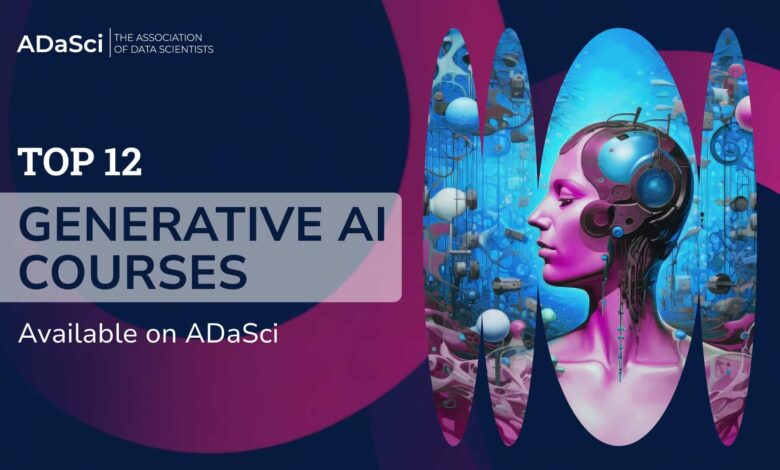Top 12 Generative AI Courses Available on ADaSci

AI is rapidly evolving, and in order to stay relevant it’s important that you match the pace and keep yourself updated with the latest AI advancements.
To facilitate this, The Association of Data Scientists (ADaSci) offers a variety of AI courses designed to cater to different expertise levels, from mastering LangChain and building AI agents to understanding RAG and parameter-efficient fine-tuning.
Whether you’re a beginner in the GenAI field or a seasoned AI professional, these courses provide hands-on experience and detailed knowledge to keep you ahead in the game. ADaSci’s unique courses are not available anywhere else.
Discover the top 12 AI courses available on ADaSci and unlock new opportunities.
Generative AI Crash Course with Hands-on Implementations
This course will help you get an in-depth understanding of GenAI and its popular models. Participants will receive a detailed knowledge of GPT models, diffusion models, different NLP transformers and ChatGPT. The course will further provide you with a hands-on knowledge of implementing GenAI models in real-world applications.
This course caters to everyone, from beginners in GenAI looking to deepen their understanding and practical skills to professionals in AI and related fields seeking to update their knowledge with the latest advancements in GenAI.
Mastering LangChain: A Hands-on Workshop for Building Generative AI Applications
This LangChain workshop will help participants master GenAI for innovative applications across industries. You will learn to build and deploy custom AI agents, leveraging LangChain for transformative personalised solutions.
Participants should have a foundational understanding of AI and basic programming skills, preferably in Python.
Diving Deeper into Retrieval-Augmented Generation (RAG) with Vector Databases
This course will help you master the core principles of RAG and its advantages over pure generative models. Participants will delve into advanced AI techniques, unlocking the synergy between RAG and vector databases. You will also understand the tools and strategies for building, deploying, and optimising RAG systems.
Parameter-efficient Fine-tuning of Large Language Models
This workshop will help you understand Parameter-efficient fine-tuning (PEFT) techniques and their benefits for LLM adaptation. Participants will learn methods like LoRA, adapters, and prompt tuning to achieve remarkable results using less parameters.
You will also get hands-on experience building and evaluating your own PEFT model on provided datasets. With this course, you can master resource-efficient training strategies and deployment options for PEFT models.
Building Generative AI Applications with Amazon Bedrock
This hands-on course will provide you with a solid understanding of the Amazon Bedrock architecture, capabilities, and applications. It will help participants develop skills in building and deploying GenAI applications on Bedrock, allowing them to gain insights into real-world use cases, best practices, and the future potential of Bedrock.
Mastering Prompt Engineering for LLMs
With this course, participants will understand the fundamentals of prompt engineering and master the art of crafting, optimising, and customising prompts for various AI models.
It will help you explore various prompting concepts and techniques such as Zero-shot and Few-shot Prompting, Chain of Thought Prompting, Knowledge Generation Prompting, and more.
The LLMOps : Streamlining the GenAI & LLM Operations
This course can be beneficial in understanding the fundamentals of LLMOps and its role in GenAI-powered systems and NLP.
Participants will develop knowledge about the workings of LLMOps and explore its challenges such as model training, deployment, monitoring, and maintenance. They will also learn the design process of LLMOps and acquire practical skills in innovating within the LLMOps operations.
Autonomous AI Agents and AI Copilots
This course will teach you the foundational concepts behind building AI agents and delve into different ML techniques that make them smarter. It also examines the challenges of creating dependable AI agents and the ethical considerations that come with them.
Through this course, you’ll be able to analyse the potential benefits and limitations of autonomous AI agents and AI copilots in different application domains such as healthcare, finance, creative work etc.
You will also understand various techniques in autonomous AI agents and copilots such as BabyAGI, MetaGPT, and Semantic Kernels.
Advanced RAG with Pinecone
This course will take your text generation skills to the next level. It will help you master the utilisation of Pinecone for information retrieval in RAG.
You’ll learn about integrating knowledge bases and crafting powerful prompts, creating informative and creative text outputs.
Building Multi-Agent LLMs with AutoGen
With this course, you’ll learn how to build multi-agent LLMs and create collaborative AI systems using the AutoGen framework.
It will also help you unlock real-world applications, exploring how multi-agent LLMs can be applied in various domains for problem-solving.
Vector Search Techniques with Weaviate
This course will help you explore advanced vector search techniques using Weaviate, a vector search engine. You will learn about Weaviate’s architecture, features, and capabilities for vector-based search and semantic querying.
Participants will dive into hands-on exercises to master indexing, querying, and optimising vector search performance.
Generative AI Application Development with Azure
This course equips you with essential skills to develop, deploy, and monitor GenAI applications using Microsoft Azure. You will gain hands-on experience with Azure’s powerful AI services, enhance your technical expertise, and learn to develop scalable AI solutions.



